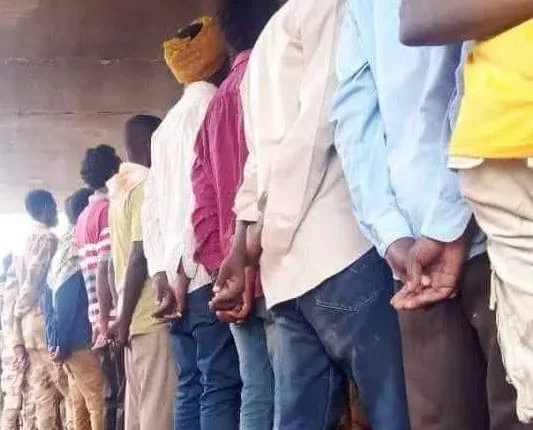The Fate of Collaborators with the RSF at Stake

Sudanhorizon – Azmi Abdelrazig
After the surrender—or defection—of the Rapid Support Forces (RSF) commander in Al-Gezira State, Abu Aqla Kikil, to the Sudanese Armed Forces, the elements and leaders of the rebellion were left in shock and unable to recover quickly. As seen in several recorded clips, this led to chaos, mutual accusations, and recriminations. They began reevaluating their ranks, blaming each other for the setbacks.
The Aftermath of Kikil’s Defection
The repercussions of Kikil’s defection manifested in angry reactions from the RSF, who, following instructions from their leaders abroad, carried out retaliatory attacks on areas considered Kikil’s social bases, particularly in eastern Al-Gezira. They arrested soldiers and collaborators who had fought alongside them, subjecting many to torture, with dozens being executed and their bodies discarded. The fate of the so-called civilian administrator of Al-Gezira State, Sadiq Othman (known as Sadiq Moya), remains unknown. It is reported that the National Umma Party figure has gone into hiding, fearing arrest, while RSF forces continue searching for him between Al-Gezira State and the outskirts of White Nile. After local RSF commander Ahmed Qaja declared that no one outside the Junayd family is to be trusted, there is suspicion surrounding Qaja himself, as he belongs to the Third Front (Tamazuj) and has no family ties to the Junayd clan. His extreme tone hints at the militia’s racial undertones and their non-national objectives.
Rebel to Al-Burhan, Traitor to Hemedti
On Monday morning, Captain Sufian Brima, who had once called himself a rebel against army leaders, appeared surrounded by RSF fighters, showing clear signs of physical abuse. One of the RSF members claimed Brima had attempted to escape and was now in their custody. They forced him to speak under humiliating conditions, interrogating him about why he had travelled from Khartoum to Tamboul without wearing his usual military attire. Caught between his rebellion against General Al-Burhan and his betrayal of Hemedti, Brima’s situation highlighted the contradiction and irony in his position.
Although the RSF intended to use Brima’s interrogation to scare others contemplating defecting from their sinking ship, it instead sent a negative message—showing the grim fate that awaits anyone who collaborates with the rebels and betrays their country.
The Case of Mazmiel Faqiri
Another widely circulated image on social media features the controversial preacher Mazmiel Faqiri. After relocating to Al-Gezira following the outbreak of war, Faqiri appeared in a video promoting the success of the agricultural season under the RSF’s supervision, similar to statements made by Alaa Naqd, the spokesperson for “Taqaddum.” However, sensing the army’s approach to Al-Gezira, Faqiri fled to Chad. He later surfaced at a mosque in Abéché, advising Chadians not to oppose their president, Mahamat Déby.
A Bad Example in Rami
The internal conflict and accusations of betrayal within the RSF are not new. They began after the failure of the RSF’s plan to seize control of the state, which resulted in the arrest of Colonel Rami Al-Tayeb in the Red Sea. Accused of collaborating with the army, Colonel Rami had previously lost the battle to open military bases in the Red Sea in coordination with the seizure of Merowe Airport in northern Sudan in 2023. After fleeing, Hemedti ordered his forces to pursue and imprison him. Rami appeared only once after that, dressed in a traditional Sudanese garment and surrounded by heavily armed guards, before rumours circulated that the militia had executed him.
A Climate of Paranoia
The RSF seems to be suffering from a crisis of trust, with mutual accusations of betrayal. Each member looks at the other suspiciously, uncertain where the next blow will come from. In a recent speech, Hemedti attempted to distance himself from the actions of his forces, labelling them as criminals: “The deviants and criminals have exhausted us.” He was referring to the notorious “Shafshafa” units, whom he relies on entirely for attacks on villages and towns, motivated by promises like “the dead are martyrs, and the survivors will benefit.”
An incident illustrating this deep-seated internal conflict occurred in Al-Gezira, where a group led by General Issam Fadil attacked the Mesid area, where militia commander Ammar Jarama had taken refuge. Jarama, who was promoted to lieutenant colonel and assigned to lead the Mesid and Alti regions, had set up checkpoints to collect tolls from passersby, amassing a fortune from these activities. Fadil’s group, desiring control over these revenues, clashed with Jarama’s forces, resulting in Jarama’s death and dozens of casualties in the ensuing battle near the Mesid market.
A Cancerous End
The attempted escape of Sufian Brima, Kikil’s defection, and the widespread suspicion among RSF members show a militia suffering from internal decay. The distrust has reached such a level that even close allies are no longer safe from accusations of disloyalty. This crisis could affect key figures like Mak Abu Shotal, Hamouda Al-Beishi, and Ibrahim Bagal. With this internal disintegration, the RSF has become a force ravaged from within, unsure of its true enemies and friends. As a result, the militia is likely to witness further internal coups and infighting. For those collaborating with the RSF, if they are not executed by their own comrades, they will surely face the wrath of the citizens, from which there is no escape.
Shortlink: https://sudanhorizon.com/?p=2153

